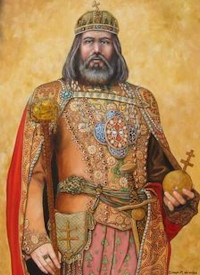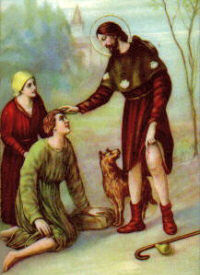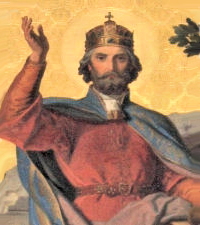Ordinary Time: August 16th
Friday of the Nineteenth Week of Ordinary Time; Optional Memorial of St. Stephen of Hungary
Other Commemorations: St. Roch (RM) ; Other Titles: Rocco, Rock, Roque
» Enjoy our Liturgical Seasons series of e-books!
Vaik, son of Geza, Duke of Hungary, was baptized about 985 by St. Adalbert of Prague who gave him the name of Stephen. He was chosen by God to bring his people to the Christian faith. With the assistance of monks from Burgundy, he established bishoprics, founded several monasteries and re-organized the whole life of the country. Pope Silvester II offered him the privilege of being crowned king and the ceremony took place on December 25, 1000. His great zeal for the spread of the Catholic faith earned him the title of apostolic king and apostle of Hungary. He died on August 15, 1038, the feast of the Assumption of our Lady, to whom he had consecrated his kingdom.
Before the reform of the General Roman Calendar today was the feast of St. Joachim, now celebrated July 26. St. Stephen's feast was September 2. St. Roch, who is in the Roman Martyrology, was from France, near Montpellier. By the sign of the cross he delivered many cities of Italy from an epidemic. His body was afterwards transferred to Venice, deposited with great honors in the church dedicated under his invocation.
St. Stephen
 St. Stephen was the first Christian king of Hungary. He was born in 975 at Gran, the son of Prince Geisa, and was baptized in 985 by St. Adalbert. While courting Gisela, the sister of Emperor St. Henry II, he was promised her hand in marriage provided that he remain firm in the Christian faith and lead the pagan Hungarians to Christianity. He kept his word though it cost him dearly. From the hands of Pope Sylvester II (999-1003) he received the royal crown and was solemnly enthroned at Gran on the feast of Mary's Assumption, 1001. (The alleged bull of Pope Sylvester granting to Stephen and his successors the privilege of having the cross carried before them, like metropolitans, is now regarded as a seventeenth-century forgery.)
St. Stephen was the first Christian king of Hungary. He was born in 975 at Gran, the son of Prince Geisa, and was baptized in 985 by St. Adalbert. While courting Gisela, the sister of Emperor St. Henry II, he was promised her hand in marriage provided that he remain firm in the Christian faith and lead the pagan Hungarians to Christianity. He kept his word though it cost him dearly. From the hands of Pope Sylvester II (999-1003) he received the royal crown and was solemnly enthroned at Gran on the feast of Mary's Assumption, 1001. (The alleged bull of Pope Sylvester granting to Stephen and his successors the privilege of having the cross carried before them, like metropolitans, is now regarded as a seventeenth-century forgery.)
Stephen was one of the wisest princes of his time. His royal generosity is shown in the establishment of the archbishopric of Gran and ten Hungarian bishoprics, and in his love toward the poor. Because he visited them in their houses and washed their feet, his right hand has remained incorrupt. Great was his zeal in prayer and meditation. From his marriage came a saintly son, the devout Emeric, an angel of purity, who died seven years before his father. By prayer and fasting Stephen sought the conversion of all Hungary; rightfully is he called the apostle of his nation. He chose the Mother of God as the patroness of Hungary.
—Excerpted from The Church's Year of Grace, Pius Parsch
Patronage: against the death of children; bricklayers; kings; masons; stone masons; stonecutters; Budapest, Hungary
Symbols and Representation: Cross and sword; model of a church; king with sword and banner of the cross; king offering his crown to the Blessed Virgin Mary; king on horseback with banner of the cross; king holding a church in his hands; king holding a standard or banner with the Blessed Virgin Mary
Highlights and Things to Do:
- Here is a saint upon the throne, who besides being king was the apostle and father of his people! Reflect his spirit in your own family and toward your associates.
- For more information on St. Stephen, see these links:
- Franciscan Media
- Catholic News Agency
- Hungarian Cleveland
- My Catholic Life
St. Roch or Rocco
 Untrustworthy sources say he was probably born at Montpellier, France, son of the governor there. He was orphaned when he was twenty. He went on pilgrimage to Rome and devoted himself to caring for the victims of a plague that was ravaging Italy. He became a victim himself at Piacenza but recovered and was reputed to have performed many miracles of healing. On his return to Montpellier, he was imprisoned for five years as a spy in pilgrim's disguise when his uncle, who was governor, ordered him imprisoned. (His uncle failed to recognize him, and Roch failed to identify himself.) Roch died in prison and was only then identified as the former governor's son by a birthmark in the form of a cross on his chest. Another biographer says that he was arrested as a spy at Angers, Lombardy, and died in prison there. When miracles were reported at his intercession after his death, a popular cult developed, and he is invoked against pestilence and plague. He is known as Rocco in Italy and Roque in Spain.
Untrustworthy sources say he was probably born at Montpellier, France, son of the governor there. He was orphaned when he was twenty. He went on pilgrimage to Rome and devoted himself to caring for the victims of a plague that was ravaging Italy. He became a victim himself at Piacenza but recovered and was reputed to have performed many miracles of healing. On his return to Montpellier, he was imprisoned for five years as a spy in pilgrim's disguise when his uncle, who was governor, ordered him imprisoned. (His uncle failed to recognize him, and Roch failed to identify himself.) Roch died in prison and was only then identified as the former governor's son by a birthmark in the form of a cross on his chest. Another biographer says that he was arrested as a spy at Angers, Lombardy, and died in prison there. When miracles were reported at his intercession after his death, a popular cult developed, and he is invoked against pestilence and plague. He is known as Rocco in Italy and Roque in Spain.
—Excerpted from the Dictionary of Saints, John J. Delaney
Patronage: bachelors; cholera; diseased cattle; dogs; epidemics; falsely accused people; invalids; knee problems; plague; relief from pestilence; skin diseases; skin rashes; surgeons; tile makers; Barano, Italy; Castropignano, Italy; Constantinople; Istanbul; Orsogna, Italy; Patricia, Italy
Symbols and Representation: Pilgrim's hat and staff; angel; dog with loaf in mouth; hat with crossed keys of with escallop; plague spot on his thigh
Highlights and Things to Do:
- St. Roch is one of the many Franciscan Saints.
- See more about relic of St. Roch's Fingers, of which Ladyfingers are a reminder.
- San Rocco is a beloved saint by Italians! See some of the places for festivals and the Italian traditions surrounding this saint:
- San Rocco Festival in Aliquippa, Pennsylvania
- St. Rocco's Feast in Malden, New Jersey
- San Rocco Society in Boston, Massachusetts
- Read more about St. Roch:






